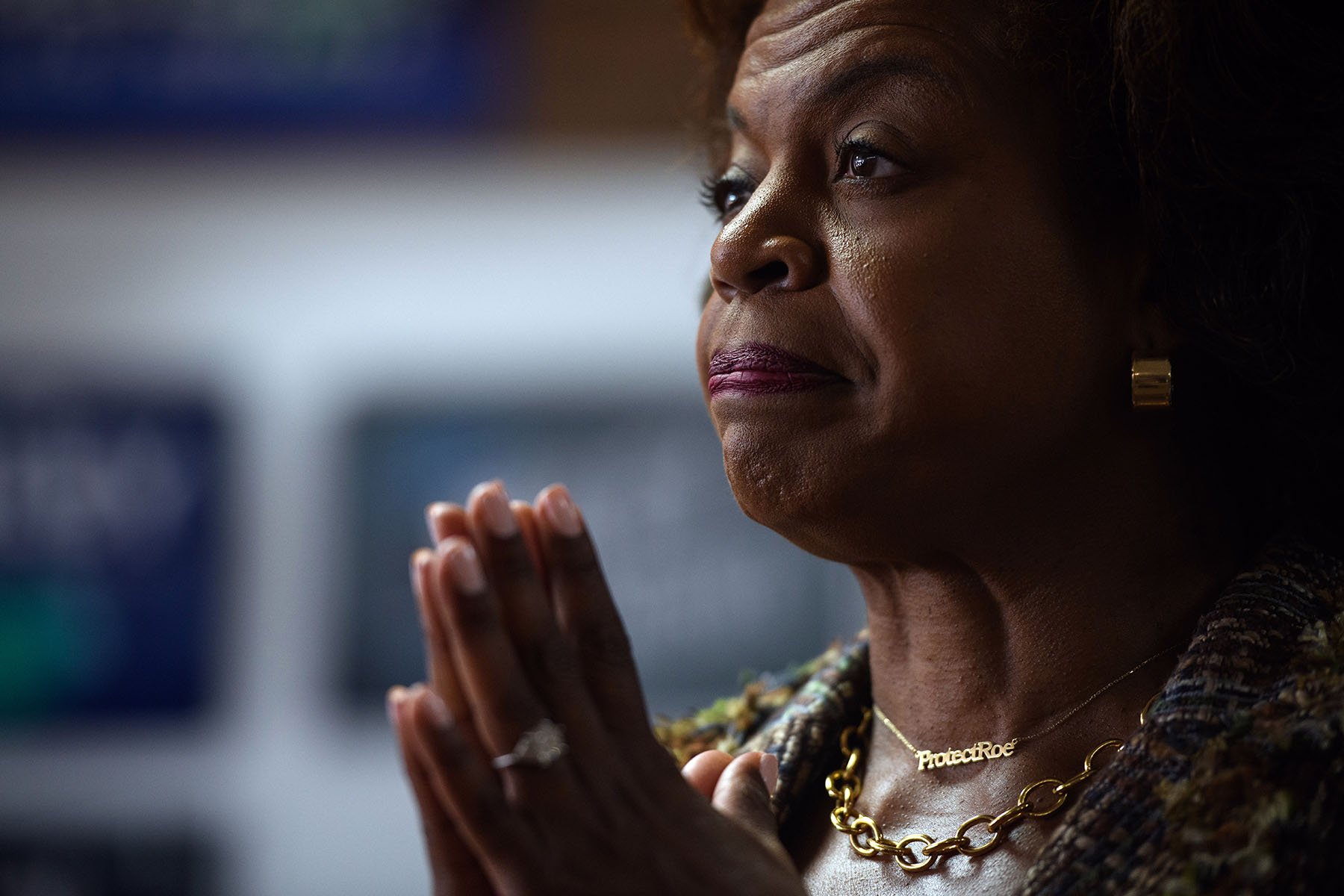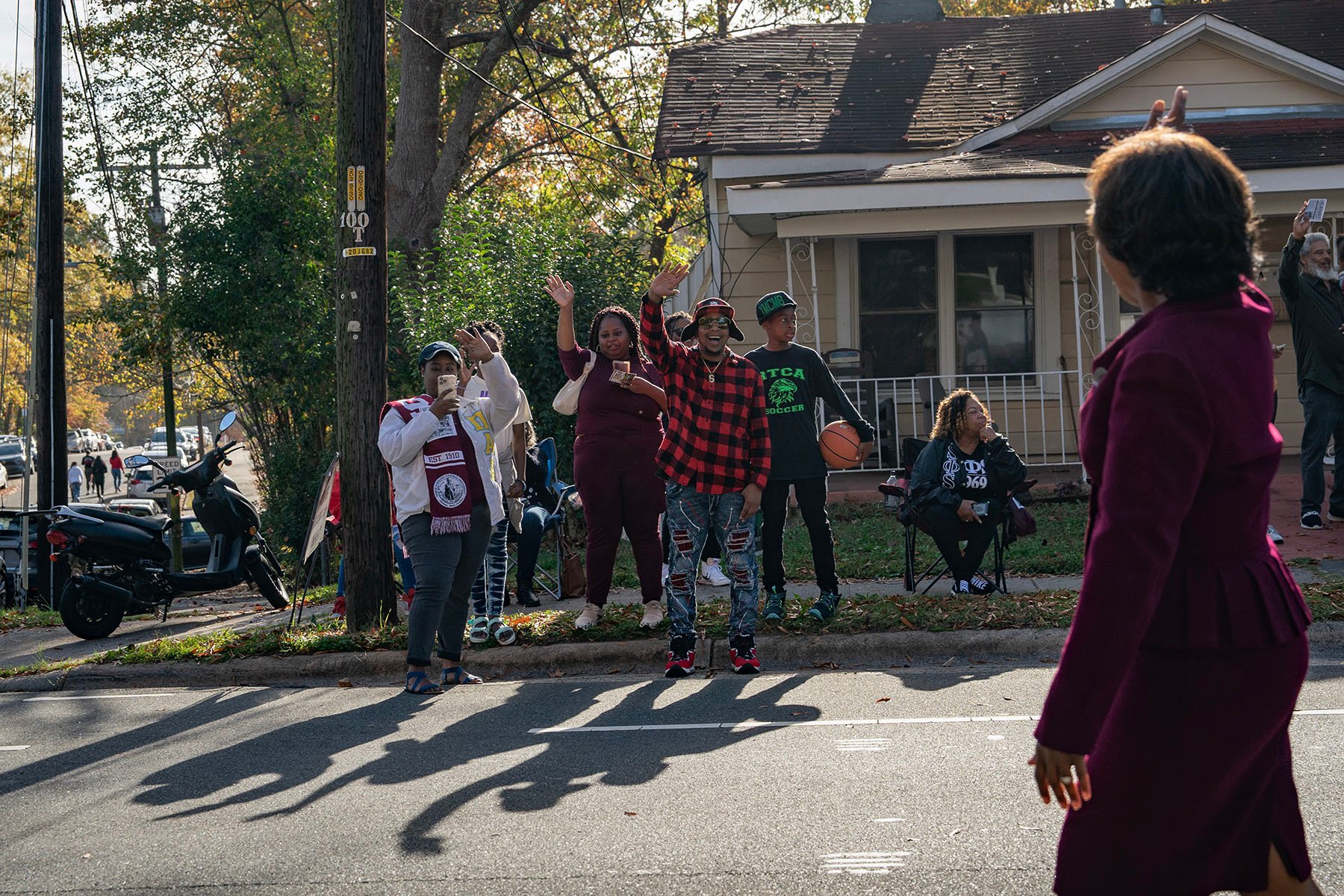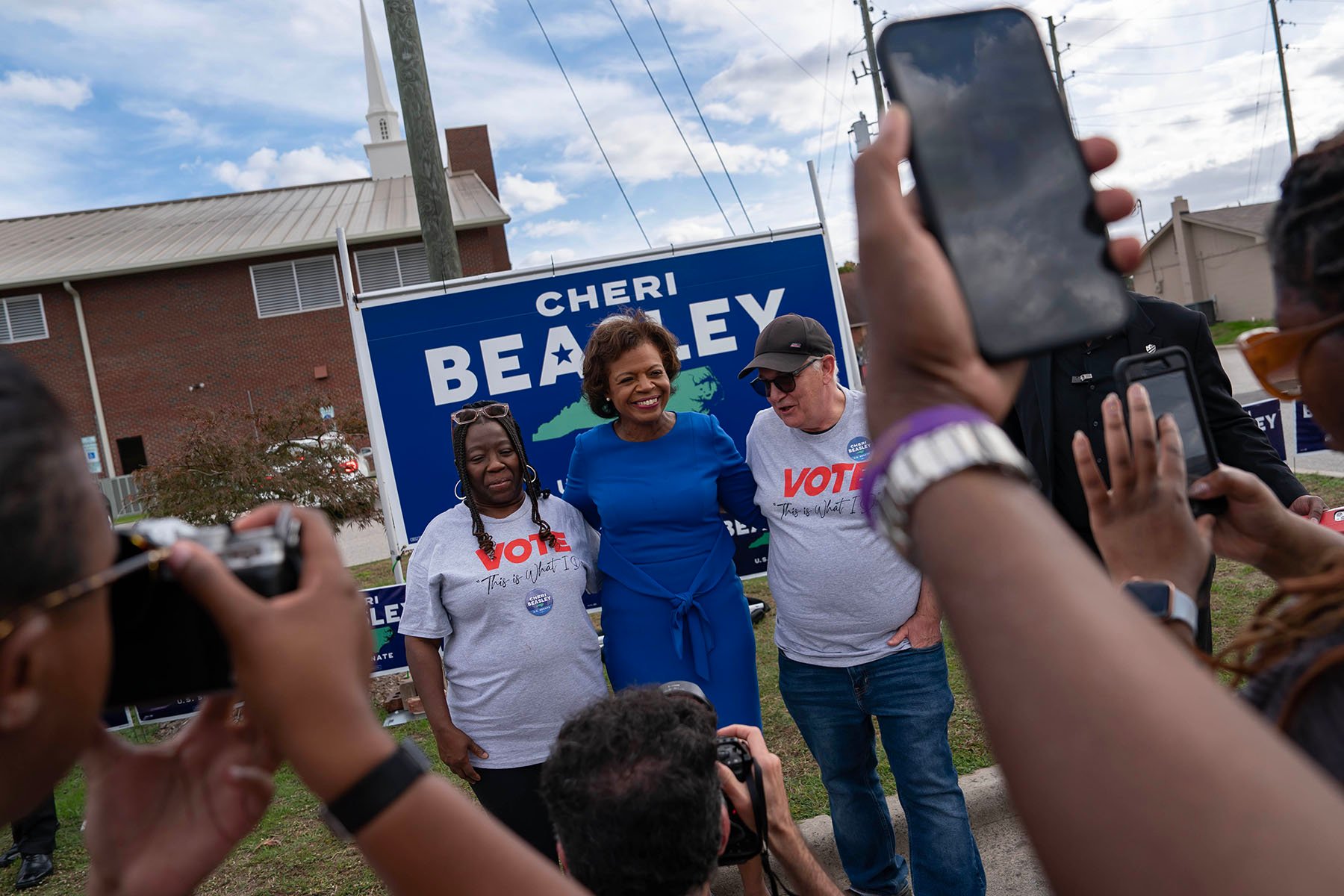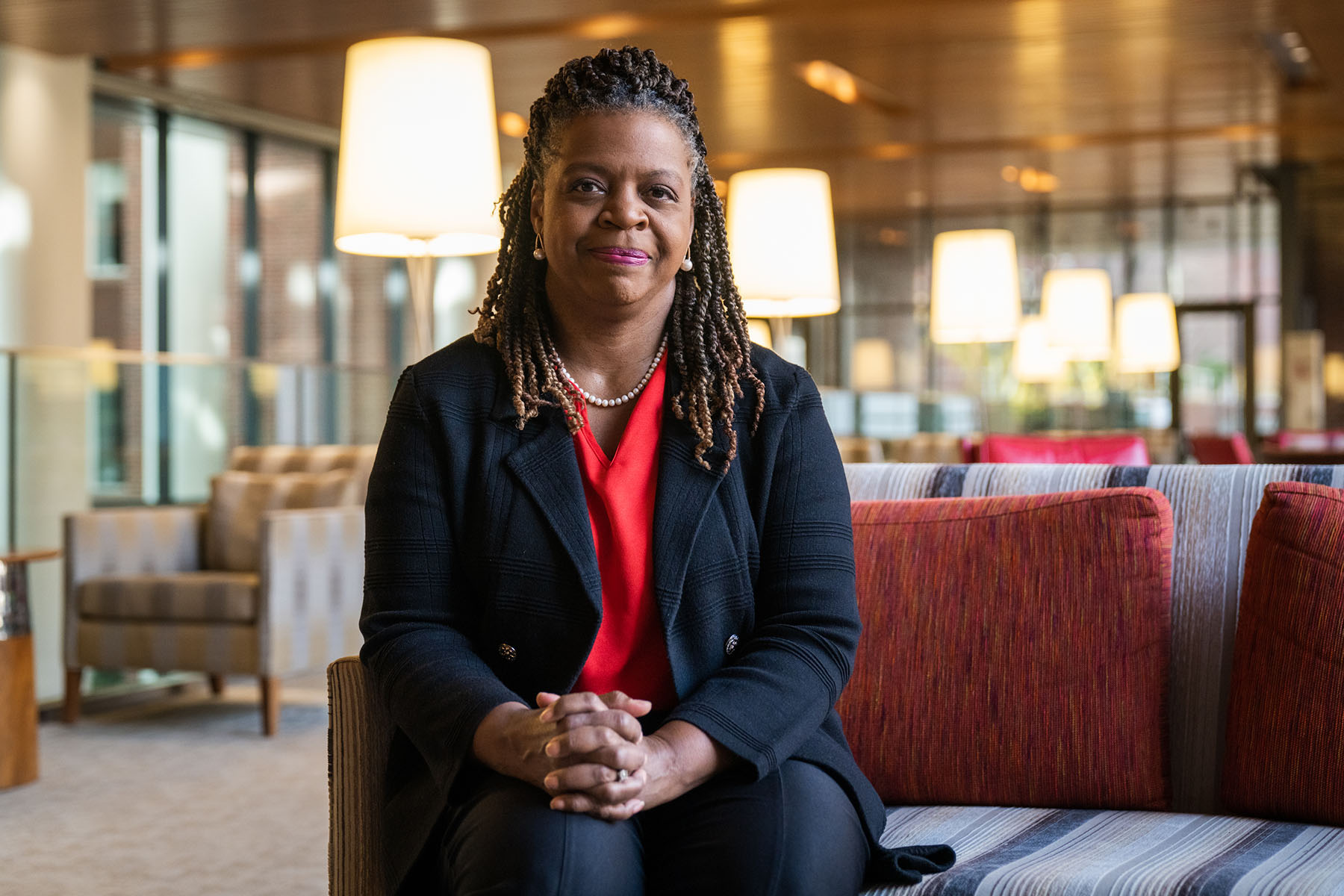CAMBRIDGE, MASSACHUSETTS — The first thing I noticed was Cheri Beasley’s hair. When she greeted me on the Harvard University campus, it was in twists, set in a half-up, half down style that fell over the front of her tweed-style blue blazer.
The look was a departure from the straightened hair she wore during her 2022 U.S. Senate campaign in North Carolina. When I commented on the change, she smiled.
“It was really after the election that I thought I would try something new,” Beasley told me. “It’s been refreshing. It’s been renewing. It’s been liberating.”
For Black women, hair has always been political. Natural Black styles in the form of braids, twists, locs and afros have long been disparaged as less professional than sleek, straight hair. In an interview during her book tour last year, former First Lady Michelle Obama said she made a conscious choice to keep her hair straightened while she was in the White House; the country, she said, was “not ready” for her natural Black hair.
Beasley’s twists, and her role as a resident fellow with Harvard Kennedy School’s Institute of Politics this semester, signal a new stage for her political engagement after more than two decades as a judge and her Senate run.

The liberation she described showed in her relaxed body language and candid words as well. In October 2022, she told me she refused to “get caught up in the pettiness of partisan politics.” Now she’s ready to offer more frank assessments of the challenges and the promise of electoral politics for Black women.
It was clear from our conversation that Beasley saw herself as much more than another candidate who lost an election. She was the first Black woman nominated by a major party for a U.S. Senate seat in North Carolina. She ran a competitive campaign as a Democrat. To her that is significant, not just personally, but for Black women candidates in the South and Black women generally. Organizers and academics who spoke with The 19th agreed. As advocates calling for more Black women in the U.S. Senate look to 2024 elections, Beasley’s campaign can serve as a powerful playbook.
“We really shouldn’t look at it as a loss for the effort of Black women running and seeking higher office,” Beasley said. “I was a credible candidate, and every time we run and fight hard, we are moving the ball forward. That makes it easier for the next African-American woman to run and hopefully win.”
Last November, Beasley lost her bid for the open Senate seat in North Carolina to Republican Ted Budd by three points. Her loss, as well as that of former U.S. Rep. Val Demings, who challenged incumbent Republican Sen. Marco Rubio in Florida, temporarily dashed the hopes of people pushing for a Black woman to take a Senate seat.
The 100-member Senate did not have a single Black woman for more than two years after Vice President Kamala Harris resigned to join the White House. That wouldn’t change until October, when Laphonza Butler became the only Black woman in the Senate. She was appointed to fill late Sen. Dianne Feinstein’s California seat.
Only three Black women in U.S. history have been U.S. senators. There has never been a Black woman governor. Securing these high-profile positions is a particular challenge for candidates who are often shut out of fundraising, networking and other opportunities more open to candidates who are White and men.
The key concern for any political candidate is whether they can win. For Black women that pressure is more acute, academics and organizers told The 19th. They’re often at a financial disadvantage in big races, with less ability to self-fund and greater challenges raising money from donors. The Senate in particular has become a “millionaire’s club,” requiring spending an average of $16 million for a race, said Katherine Tate, a professor of political science at Brown University.

“Often these senators are independently wealthy, and so this prevents a lot of Black women from being considered suitable to run for these offices, because they just don’t have that kind of wealth,” she said. “That’s a challenge when you want to integrate the highest levels of government.”
Misconceptions about Black women also shape voters’ ability to connect with these candidates. They are often viewed as singularly focused on championing issues that affect Black people as opposed to the broader electorate, said Nadia Brown, a professor of government and director of women’s and gender studies at Georgetown University.
“That’s the rub: How can Black women appeal to these larger audiences outside of majority-minority districts?” Brown said. “What my research shows is that voters think about Black women as these kind of niche candidates or politicians who are great with dealing with issues that are at the nexus of race and gender, but they’re not good on traditional ‘masculine’ issues like taxes or war, and things that are going on in the news right now.”
In North Carolina, Beasley had to deal with those factors, as well as the realities of running as a Democrat in a Republican-leaning state. She was tasked with not only energizing the urban Democratic base, but also connecting with rural, independent and conservative voters.
It’s a particularly challenging state, said Diane Robertson, a Democratic Party precinct chair for North Carrboro, North Carolina, who was a member of Beasley’s “kitchen cabinet” — the unofficial group of advisers for her Senate campaign.

While Black women tend to perform better in more diverse urban areas with a Democratic base, North Carolina has the second-largest rural population after Texas — 3.4 million people. Last year, unaffiliated voters became the largest voting bloc in the state.
This combination of factors means that candidates have to put in more work to travel to each of the state’s 100 counties, 80 of which are rural, to reach as many voters as possible, Robertson said. They also need to raise a lot of money for media exposure.
Black women have the additional burden of pitching themselves as someone who can represent a majority-White population that has few interactions, if any, with Black woman candidates.
Beasley took that challenge head on.
“I feel good about the fact that we had a lot of folks who shared our beliefs and understood that I was in this race to really fight hard for all of North Carolina, and for this country,” Beasley said. “It’s an honor that people were gracious enough to support me; we received contributions from all 100 counties in the state. But of course, the loss was disappointing.”
Beasley adopted what one state senator referred to last year as a “North Carolina flavor” campaign.
She spent time in rural areas of the state and made an intentional effort to push for issues she believed rose above partisan identity, such as lowering health care costs, supporting small and rural towns, and expanding benefits for families, such as the child tax credit and paid family leave. Ultimately she outraised Budd by more than $20 million — a notable feat for a Black woman Democrat in a state that has only ever elected two women total (one of them a Democrat) as U.S. senators.
“Cheri, in my opinion, completely did her part,” said Stefanie Brown James, co-founder of The Collective PAC, which supports progressive Black political candidates. “What fell short was everybody else’s contributions, and the Democratic infrastructure and ecosystem to be able to go toe-to-toe with the outside spending for her opponent and against her on the airwaves.”

National Democrats have been criticized by organizers and some election watchers for not giving Beasley’s race more attention and money. Beasley echoed this criticism. Local, state and national Democrats urged her to run, she said; national Democrats said they would invest in her race. But then their interest went elsewhere.
“National Democrats’ unwillingness to invest was a huge disappointment and, in significant part, led to my loss,” Beasley said in a follow-up email. “Promises to invest in my race were made by national Democrats which never materialized.”
As Beasley’s team moved forward, the messaging against her at times relied on racial biases or stereotypes.
Beasley recalled one political ad that questioned her record as a family court judge early in her career, implying that her decisions on the court were harmful to children.
Another ad targeted her time as chief justice of the North Carolina Supreme Court. The ad, titled “Failed Our Children,” claimed that Beasley either released or threw out indictments for three people accused of sexual crimes involving children. North Carolina television stations ultimately pulled the ad after a Democrat-aligned legal group wrote letters to the stations calling the ad misleading.
“These groups that spend millions of dollars targeting me and other African-American women know exactly what they’re doing when they do that,” Beasley said. “It’s cruel and it’s unfair to voters.”
Linking Black women to criminals — even child abusers — is a strategy used in other instances. In her confirmation hearings last year, now-Justice Ketanji Brown Jackson faced questions from Republican senators who repeated misleading claims about her sentencing record in several child sexual abuse cases.
“I think this portrayal is particularly hurtful because it goes back to the stereotypic trope about Black women not being good mothers,” Brown said. “They are seen as unfit to mother, they are seen as not nurturing, not caring.”
Beasley is aware of the collective hardships Black women candidates face — from the lack of robust financial investment to blatant racism. These difficulties keep some Black women from running for office altogether. Brown James and Brown both said there is little evidence that support for Black women candidates from the political establishment has improved since Beasley’s loss.

Despite the continued challenges, Beasley said she sees the positives of her campaign. She has demonstrated that Black women can be competitive candidates who can raise large amounts of money and connect with a wide sector of a state population.
Other shifts in the political landscape are paving a way for more Black women in political positions. Over the last several years a growing number of Black women have run for elected office around the country. In certain areas, such as the suburbs, demographic changes in the electorate have fostered more voters who trust Black women candidates and their capabilities, Tate of Brown University said. Black women overall are proving more that they not only have what it takes to win over voters from different backgrounds but can gain the resources to run high-caliber campaigns.
While Butler said she will not run to hold the seat she was appointed to, it’s likely the next Senate will have at least one Black woman. Rep. Lisa Blunt Rochester of Delaware is viewed as a favorite to win, and in Maryland, Prince George’s County Executive Angela Alsobrooks has endorsements from a number of high-ranking Democrats in the blue state.
Beasley said it’s exciting to see the line-up of Black women for 2024, and she is hopeful there will continue to be advancements in this representation.
“It’s monumental that I was the first African-American woman to be the Democratic nominee for the U.S. Senate in North Carolina,” Beasley said. “But I also know that it’s important for us to figure out how to win these races. There’s a wealth of opportunity.”









